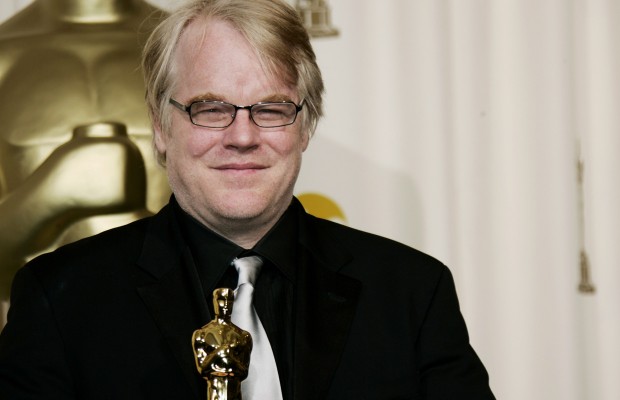The essential guide to Philip Seymour Hoffman movies

PHILIP SEYMOUR HOFFMAN: n a Sunday, March 5, 2006, file photo, actor Philip Seymour Hoffman poses with the Oscar he won for best actor for his work in "Capote" at the 78th Academy Awards, in Los Angeles. PHOTO: ASSOCIATED PRESS/KEVORK DJANSEZIAN
Philip Seymour Hoffman died on Feb. 2 at the age of 46. Considered by many to be one of the greatest actors of his generation, he will be deeply missed.
In addition to his starring roles, Hoffman had a particular gift for supporting roles and with small parts in “The Big Lebowski,” “Along Came Polly,” “Hard Eight,” “Moneyball,” “Strangers with Candy,” “Cold Mountain,” “Almost Famous,” and “The Ides of March,” contributed immeasurably to the artistic success of the films. There is truly not a single film or performance that doesn’t deserve a mention. His few onscreen minutes in “Catching Fire” elevated the entire “Hunger Games” series. He was even great in the teen zombie comedy “My Boyfriend’s Back.”
Here, in chronological order, is our list of essential Philip Seymour Hoffman viewing.
Boogie Nights (1997)
Here’s where we fell in love with Philip Seymour Hoffman. He plays Scotty, the overweight and underappreciated camera grip in Paul Thomas Anderson’s porn–industry-as-dysfunctional-family-comedy-drama. A heartbreakingly awkward punching bag for the good looking talent, Scotty’s limited screen time is acting perfection.
Happiness (1998) Todd Solondz’s unforgettable black comedy benefits from a subversively brilliant screenplay and an ensemble who relished the outrageous opportunities that piece of writing held. Every performance in the film is a thing of beauty, including Hoffman’s creepy obscene phone caller Allen. The climactic scene with the object of his twisted adoration, played by Lara Flynn Boyle, is a work of dark comic genius.
Magnolia (1999) Another true ensemble piece, the film’s steadiest heartbeat is the down-to-earth home health care nurse played by Hoffman. He approached the role with understatement and unveiled a level of compassion that not only characterized this man’s calling, but allowed the audience to find a way to empathize with the rest of the less likeable characters. It’s a beautifully nuanced and deeply authentic performance.
Almost Famous (2000)
As legendary rock critic Lester Bangs, Hoffman gives Almost Famous its critical reference point, as the middle ground between the two worlds the young William (Patrick Fugit) is juggling. Even with limited screen time, Hoffman conveys a funny, heartfelt, and deceptively sad persona that is essential to the film’s success.
Capote (2005)
Hoffman received his first Oscar nomination for the 2005 biopic, which makes you wonder where the Academy’s heads had been the previous ten years. He won for his unerring turn in this beautifully observed film about the writing of Capote’s masterpiece In Cold Blood. Never one to shy away from a character’s faults, Hoffman unveiled an equally sympathetic and mercenary soul as the writer befriends inmate Perry Smith.
Charlie Wilson’s War (2007) The year 2007 was a big one for Hoffman. He garnered an Oscar nomination for his supporting turn as Gus Avrakotos, government agent working with senator and playboy Charlie Wilson (Tom Hanks) to assist Afghanistan rebels in their war with Russia. It was one of three performances that year that could easily have earned Hoffman his second Oscar, each as different from the other as performances could be. He gives needed edge and weight, as well as biting humor, to a film that could have been too sentimental otherwise.
The Savages (2007)
Also that year, dream team Hoffman and Laura Linney play a brother and sister faced with caring for their aged, abusive father. Full of brilliant, darkly funny insights on correcting old wounds, responsibility versus irresponsibility, inevitability and family, the film is queasyingly realistic and relevant but the performances are a laugh riot, uncomfortable as they are.
Before the Devil Knows You’re Dead (2007) In his third award-worthy turn in 2007 Hoffman finds himself with a character that a great actor would dream of and the lesser of the world could only screw up. An older brother (Hoffman) hiding dark, addictive behavior, talks his sad-sack younger brother (Ethan Hawke) into something unthinkable. Desperate for approval, sensitive in the weirdest moments, black hearted the next, Andy is a fascinating character thanks to Hoffman’s effortless genius.
Doubt (2008) Hoffman and Meryl Streep – one of his only true peers – face off as a priest who may have molested a student and the nun who will doggedly pursue the case. Hoffman never judges his character, bringing a self righteousness and grace to the part that allows the audience to doubt his guilt. Without that, the film bottoms out into just another finger pointing diatribe on the Catholic Church. But because Hoffman could walk the line perfectly – and because Streep and co-stars Viola Davis and Amy Adams are so goddamn talented – the film is a brilliantly ambiguous conundrum.
The Master (2012) Hoffman is a gravitational force as Lancaster Dodd, the charismatic leader of a Scientology-esque group. Pairing Hoffman with Joaquin Phoenix may have been director Paul Thomas Anderson’s greatest moment of casting genius. Phoenix’s disheveled, unhinged veteran vagabond balances Hoffman’s egomaniacal Master so perfectly that every moment the pair shares onscreen is theatrical magic. It’s a flawless film boasting two epic performances.
Tags: actor, almost famous, before the devil knows you're dead, boogie nights, capote, celebrity, charlie wilson's war, death, doubt, happiness, heroin, magnoila, Oscars, philip seymour hoffman, The Master, the savages
Story © 2014 Saga Communications - Images © 2014 Associated Press










